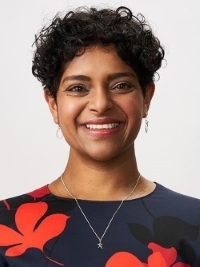
Barrister Dhilum Nightingale’s role in the Immigration and Refugee Law Committee is just one of the ways she helps vulnerable and marginalised ethnic communities in Aotearoa.
Dhilum says lack of access to justice often has compounding impacts on vulnerable migrants.
“Our systems are complex and hard to navigate. There are usually language barriers, fears around engaging with the Government and lawyers, and lack of access to social welfare and legal aid, other than for refugee and protected person status claims,” she says.
“It’s so important to ensure immigration policies are as fair as possible and take into account cultural factors and needs.”
Dhilum says in the immigration space, changes happen quickly and usually without a legislative process.
“So, you need to keep a constant watching brief on policy reform and be prepared to advocate strongly where needed,” she says.
Keen to be involved
Dhilum, who has been on the committee since October 2023, says she joined to be more involved in humanitarian immigration policy, including for family violence victim survivors and exploited migrant workers.
“I believe my ethnic background provides me with a cultural empathy and understanding as has my years of advocating for vulnerable people in ethnic and migrant communities through Community Law Wellington and Hutt Valley’s refugee and immigration service.”
“I want to take this understanding and ensure it contributes to achieving fair and workable policy reform,” she says.
Dhilum finds her work on the committee rewarding because it allows her to engage with experienced immigration and refugee lawyers on a range of important immigration issues, and influence policy development and law reform.
The committee’s role
The committee is frequently approached for comment on topical and pressing immigration and refugee issues such as the recent operational review of the Accredited Employer Work Visa (AEWV) which found numerous deficiencies in Immigration New Zealand’s processing of work visas.
Dhilum says the spotlight on the AEWV scheme has resulted in some processing improvements and she hopes that the Government will soon bring the long overdue review of the Family Violence Visa policy also onto its agenda.
“It’s extremely important to bring clients’ experiences into policy reform,” she says. “As we help our vulnerable clients navigate Aotearoa's immigration, and refugee and protection processes, we gain a deeper understanding of the various factors which prevent or restrict them from accessing justice,” she says.
“We can then use those insights to meaningfully advocate for reform, and to ensure our clients' voices and experiences inform changes to our systems and processes. “
Volunteering worth it
Adding another volunteer role to her already busy schedule has been worth it.
“The committee plays a valuable role in helping the Law Society undertake its statutory function of helping and promoting law reform, in order to uphold the rule of law and facilitate the administration of justice in New Zealand,” she says.
A barrister in Kate Sheppard Chambers, Dhilum says her strong sense of social and environmental justice, cultural awareness and sensitivity is guided by her Sri Lankan heritage.
“I’m always looking for ways to deliver the best legal advice and support to clients, looking holistically at their situation and goals, and thinking of what solutions might be available outside the box,” she says.
Dhilum says it was a huge leap of faith to move to the bar, but she hasn’t looked back.
“Being at the bar lets me shape my practice in the way that works best for me, allowing me to work on the issues I care about and with ethnic and vulnerable communities, who are frequently let down by our justice system,” she says.
Dhilum is also on the executive of Wellington Women Lawyers Association, the Wellington branch of the Resource Management Law Association and frequently speaks on panels regarding women and the law and the needs of vulnerable and marginalised ethnic communities.
She is also working on two Borrin-funded research projects looking at ways of improving employer accountability for exploitation and documenting the experiences of ethnic women who report violence and go through a Family Court process.
“My interview-based research will recommend changes that are needed to our Court processes and systems to reduce barriers to women reporting family violence and leaving abusive relationships,” she says.
In addition, she runs a Charitable Trust called VERI-Mi which is building a website and app that will help vulnerable migrant workers get trusted information about their employment rights and access free legal and cultural advice. It will also help them collate evidence of exploitation which they can use to seek redress against their employer.
The concept was developed in a Creative HQ social impact accelerator, and Dhilum is pleased to have secured enough funding to start building the digital platform and start making the concept a reality.
Varied work
Practising as a Barrister allows Dhilum to take on a portfolio of varied work. She also practices resource management and environmental law and is an accredited RMA Hearings Commissioner.
“I value being able to undertake a range of interesting legal work, but supporting vulnerable ethnic and migrant people in Aotearoa is absolutely where my heart is. This is why I wanted to become a lawyer,” she says.
“To bring my own personal and cultural experiences into my practice and help ensure our law and systems are culturally responsive and empathetic to the needs of marginalised people in our communities.”
